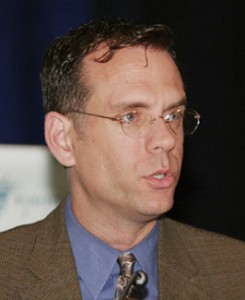OutRight: Propaganda, More or Less
Is American healthcare ‘Sicko’? (Part 2)
Sicko, Michael Moore’s indictment of America’s healthcare system, proposes healthcare for all. Free treatment. Free drugs. All provided by the government. What’s not to like? Before gay Americans rush to embrace state-run healthcare, we ought to think very hard about it.
Start with the basic proposition that healthcare is something gay Americans need more than most other Americans. For gay men, the need is obvious and the stakes are very high. The Centers for Disease Control and Prevention estimates that 232,000 gay men in the U.S. are living with HIV/AIDS. In 2005, male-to-male sexual transmission accounted for about 70 percent of new cases among males.
HIV disease is chronic and potentially fatal. Keeping it under control requires frequent visits with doctors, monitoring of blood, and a very expensive regimen of prescription drugs. All of this places disproportionately large demands on the healthcare system, including on patients, nurses, doctors, drug manufacturers, insurance companies, and taxpayers.
Over time, the life-saving drugs that have been available for a decade now often stop working effectively. HIV develops resistance to them. That means new drugs must replace the old ones.
Somebody has to provide, and to pay for, all of this expensive care.
How do we do it? America’s answer so far has been a hodgepodge of private insurance and public subsidy. In countries Moore would like us to emulate, the answer has been government-controlled healthcare.
I don’t have answers about how to reform America’s system, if at all. And it’s difficult to talk about the issue in the abstract, since the devil will be in the details. But here are a couple of things that gay Americans, especially, ought to think about.
First, as a general matter, we should be wary of any proposal calling for greater government control. Historically, government has been an enemy of gay people. While that has begun to change, there is no reason to believe that government at the federal level and in most states will not continue to be an adversary for some time.
What might this adversary do to our healthcare? Any state-run system will mean government funding of hospitals, doctors, and drugs. With funding comes control.
Efforts will be made to control costs, and decisions will be made about how to allocate limited budgets. Politics will govern those decisions, yet gays’ political clout is small. Questions will be asked: How much of the public fisc should be devoted to paying for new drugs for people who continue to get themselves infected with an avoidable disease? How many HIV specialists do we really need and how much should we pay for their services? If we have to pay to treat their disease, shouldn’t we be monitoring their lives more closely to prevent it?
There are rational ways of discussing these sorts of questions, but given our history with government, there is little reason to believe reason will dominate the political discussion. The questions will be answered by the people who gave us bans on immigration by HIV-positive people and the military exclusion.
Other countries with government-run healthcare—notably Moore’s favorite countries, like Canada, Britain, and France—have much more enlightened attitudes toward homosexuality. There is comparatively less reason to fear turning such an important matter over to public authorities in these countries.
The U.S. is different.
The private sector, by contrast, has led the way for equality. Unlike the federal government and most state governments, most large private companies now ban discrimination against gays and many offer health benefits to same-sex couples. That’s not because they’re nice; it’s because they compete with each other for the best employees.
But if the government were the only game in town, as it would be under some proposals for healthcare reform, there would be no competitive pressure to ensure gay Americans are treated fairly. It’s hard even to know how sweeping the consequences might be in a political environment still quite hostile to homosexuals.
Second, America is now the leader in medical advances of all kinds: education, treatment, and most importantly for our purposes, the development of new drugs. One of the reasons America spends so much more on healthcare than other nations is that it is a leader in these areas. Other countries free-ride on American research and development.
Tens of thousands of gay men in this country are alive today because profit-seeking private companies, with the help of public investment, researched and developed life-saving anti-HIV drugs.
But drug development is risky. Most new drugs are scrapped because they don’t work or are dangerous. Creating and testing them costs a lot of money. Unless private investors can be tempted with the possibility of large profits, they won’t take chances and drugs won’t get developed.
Government-controlled healthcare doesn’t mean drug development will stop. But there will be strong efforts to limit drug costs, which will limit profits, which will have some stifling effect on development. There will be some risk that not as many expensive new AIDS drugs will enter, or get through, the development pipeline. That could mean lives lost as resistance to existing drugs sets in.
None of this is decisive, even from a gay perspective, against all reform of healthcare. But nobody should pretend the choices are risk-free. And we should not indulge the fantasy that healthcare will ever be “free.”
Writing from the conservative side, Dale Carpenter began his column for OutSmart in 1994, when he lived in Houston. Now residing in Minneapolis, Carpenter is a University of Minnesota Law School professor.












Comments